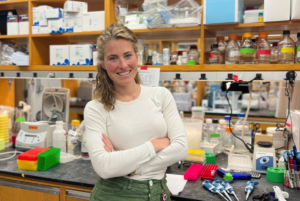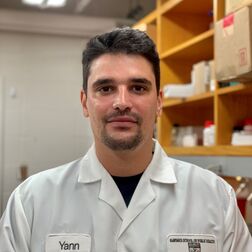Sophie Lockwood, Unlocking cellular secrets to better treat diseases
Lockwood, a doctoral candidate in the Department of Molecular Metabolism at Harvard T.H. Chan School of Public Health, will graduate in May with a PhD in Biological Sciences in Public Health. As a student, she has sought to understand the biological mechanisms involved when cellular processes go wrong during disease. After graduation, she plans to join a consulting firm, where she will focus on creating strategies for how biotechnology companies can commercialize drugs and bring them to patients.
Yann Cormerais was named a 2021 Glenn Foundation for Medical Research Postdoctoral Fellow in Aging Research: November 11, 2021

This program was developed to provide support for postdoctoral fellows (MD, MD/PhD and PhD) who specifically direct their research towards basic aging mechanisms and/or translational findings that have direct benefits to human aging and healthspan.
Madi Cissé was awarded the 2021 Damon Runyon Fellowship which will support his research on how mTORC1 sens and integrates oncogenic signaling and nutrient sensing within the microenvironment: August 8, 2021
 “Dr. Cissé aims to define the functional importance of nutrient sensing within the tumor microenvironment. How cells sense and adapt to the availability of nutrients in their environment is incompletely understood, but one key pathway is the signaling system anchored by the mTORC1 kinase. The mTORC1 kinase regulates cell growth and metabolism in response to nutrients such as amino acids and glucose. Aberrant mTORC1 signaling is implicated in several cancers, including melanoma, known to be heavily influenced by factors in the microenvironment such as nutrient availability. Dr. Cissé aims to understand how tumor metabolism senses and responds to varying nutrient levels, which will be essential for developing novel therapeutic targets.” Damon Runyon Cancer Research Foundation – Meet Our Scientists
“Dr. Cissé aims to define the functional importance of nutrient sensing within the tumor microenvironment. How cells sense and adapt to the availability of nutrients in their environment is incompletely understood, but one key pathway is the signaling system anchored by the mTORC1 kinase. The mTORC1 kinase regulates cell growth and metabolism in response to nutrients such as amino acids and glucose. Aberrant mTORC1 signaling is implicated in several cancers, including melanoma, known to be heavily influenced by factors in the microenvironment such as nutrient availability. Dr. Cissé aims to understand how tumor metabolism senses and responds to varying nutrient levels, which will be essential for developing novel therapeutic targets.” Damon Runyon Cancer Research Foundation – Meet Our Scientists
Meghan Torrence was awarded the Edgar Haber Award for outstanding achievement in the biological sciences, awarded annually to a graduating BPH student: May 5, 2021
 Meghan earned this award due to the remarkable and novel discovery shared in her dissertation research, much of which was published earlier this Spring in the journal eLife, that a gene regulatory factor is known to be involved in adaptation to cellular stress also plays a previously unknown, independent function in promoting cell growth by altering amino acid metabolism, which has important implications in our understanding of the metabolic properties of growing tumors.
Meghan earned this award due to the remarkable and novel discovery shared in her dissertation research, much of which was published earlier this Spring in the journal eLife, that a gene regulatory factor is known to be involved in adaptation to cellular stress also plays a previously unknown, independent function in promoting cell growth by altering amino acid metabolism, which has important implications in our understanding of the metabolic properties of growing tumors.
Aaron Hosios among panelists in “Meet the Scientists” Discussion at Boston Public Library: February 11, 2021
2021
“The digital event, hosted under the library’s Youth Outreach initiative and intended primarily for Boston-area teenagers, covered everything from the nuts and bolts of pursuing a PhD to the sense of bliss that comes with making a discovery.”
To read the article, please click here.
Fixing broken lines of communications: March 26, 2019
In a new Science paper, Brendan Manning, professor of genetics and complex diseases, and colleagues reveal how a previously understudied enzyme may help fuel the metabolism of cancer cells and contribute to the development of other diseases, including diabetes and obesity.
To read the article, please click here.
Brendan Manning, Xihong Lin receive prestigious NCI award: October 20, 2015
Two faculty members from Harvard T.H.  Chan School of Public Health—Xihong Lin and Brendan Manning—will receive the prestigious National Cancer Institute Outstanding Investigator Awards (OIA). These multimillion-dollar seven-year awards, providing extended funding stability, are aimed at giving promising and productive investigators enough time and money to continue or embark on projects of unusual potential in cancer research—and to take greater risks in their work.
Chan School of Public Health—Xihong Lin and Brendan Manning—will receive the prestigious National Cancer Institute Outstanding Investigator Awards (OIA). These multimillion-dollar seven-year awards, providing extended funding stability, are aimed at giving promising and productive investigators enough time and money to continue or embark on projects of unusual potential in cancer research—and to take greater risks in their work.
To read the rest of the article, please click here.
New insights into the mechanism behind tuberous sclerosis complex tumors: December 5, 2014
Findings by Harvard T.H. Chan School of Public Health’s Brendan Manning, professor of genetics and complex diseases, are providing new insights into tuberous sclerosis complex (TSC) — a rare genetic disease that causes the widespread growth of benign tumors — and may ultimately lead to treatment. His work characterizes the molecular mechanisms involved with the functional loss in one of two genes that ultimately leads to TSC tumors. (Link)
Dr. Manning promoted to Professor of Genetics & Complex Diseases: July 1, 2013

Dr. Manning’s research is focused on the interface between signaling and metabolic control under physiological and pathophysiological conditions. He is particularly interested in defining the control mechanisms and functions of a complex signaling network that is implicated in a diverse array of human diseases, including the majority of genetic tumor syndromes and cancers, metabolic diseases such as diabetes and cardiovascular disease, neurocognitive and neurodegenerative diseases such as autism and Alzheimer’s, and autoimmune diseases. As a postdoctoral fellow in the laboratory of Lewis Cantley, he found that the tumor suppressor TSC2 is the key molecular link between the PI3K and mTOR pathways. This finding helped connect a primary growth factor and insulin-stimulated pathway (PI3K), which is also activated in the majority of cancers, to a ubiquitous nutrient-sensing protein kinase that promotes cell growth (mTOR). Since that early landmark discovery, he has continued to make major contributions to our understanding of this key regulatory hub in mammalian cells and tissues, including the recognition that mTOR is a central player in the control of anabolic processes driving the synthesis of proteins, nucleic acids, and lipids. His laboratory’s findings are providing both underlying mechanisms and potential therapeutic strategies for common complex diseases, such as cancer and diabetes. In the future, Dr. Manning plans to expand his research to explore molecular events contributing to aging and autism spectrum disorders, other areas where this signaling network has been implicated.
Dr. Manning received his PhD in molecular, cellular, and developmental biology from Yale University in 2000. After completing his postdoctoral training in signal transduction, cell biology, and systems biology at Harvard Medical School, he was recruited to the Harvard Chan School in 2004 as the first junior faculty member of the then newly established Department of Molecular Metabolism. Dr. Manning is also affiliated with the research programs in cancer cell biology and kidney cancer at Dana Farber/Harvard Cancer Center.
Harvard Gazette: March 18, 2013
HSPH researchers identify key mechanisms in cellular growth process
A new study by Harvard T.H. Chan School of Public Health researchers is the first to identify the primary mechanism controlling a metabolic process essential for cell growth and proliferation. This pathway is centered around the mTOR protein, which relays growth signals to cells in response to external stimuli, including insulin and nutrients. The scientists speculate that one day researchers may be able to use this new knowledge to develop treatments for certain cancers which have uncontrolled mTOR signaling.
The study appeared online in the February 21, 2013 issue of Science Express.
Metabolic Changes in Cancer Webinar: April 19, 2012
Please visit http://webinar.sciencemag.org/webinar/archive/metabolic-changes-cancer to view this seminar.
HSPH News: March 1, 2011
Brendan Manning receives Armen Tashjian, Jr., award for excellence in endocrine research